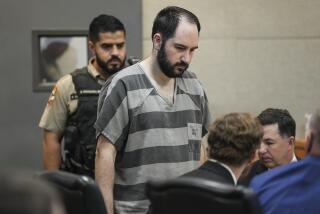Peyer Plea Challenges Trial Judge’s Rulings
- Share via
An attorney for Craig Peyer filed a lengthy appeal Friday, arguing that the former CHP officer’s 1988 first-degree murder conviction should be overturned because the trial judge violated Peyer’s right to a fair trial with several rulings.
The appeal, about 1 1/2 inches thick and 300 pages long, was filed in the state’s 4th District Court of Appeal by attorney Christopher J. Schatz of San Diego. Schatz raised several issues as grounds for a new trial, including:
- Rulings by Superior Court Judge Richard Huffman allowing prosecutors to paint a psychological profile of Peyer so jurors could consider a theory of guilt based on “predisposition of character.” This, Schatz said, is “so inherently unreliable and prejudicial as to be unconstitutional.”
- Purported errors by Huffman in failing to “enact procedural safeguards” during jury selection to ensure that jurors were not prejudiced by pretrial media reports about a polygraph test given to Peyer before his arrest. The test showed that Peyer was deceptive when asked about the slaying of Cara Knott.
- Alleged violation of Peyer’s rights to a fair trial when Huffman allowed 31 young women to testify about lengthy and questionable nighttime stops made by Peyer near the Mercy Road off-ramp and Interstate 15, where Knott was killed Dec. 27, 1986.
- A Huffman ruling that allowed prosecution witnesses to testify about Knott’s “habit” of being safety-conscious that supposedly prejudiced Peyer’s constitutional rights. Several witnesses testified that Knott was cautious and had taken self-defense classes.
- Alleged violation of Peyer’s rights when Huffman ruled that the defense could not present evidence about a mysterious hitchhiker who was seen on a freeway on-ramp used by Knott on the night she was killed. Defense attorneys wanted to tell the jury that the hitchhiker could have kidnaped the young woman and killed her.
Insufficient Evidence
In the voluminous appeal, Schatz also argued that there was insufficient evidence to convict Peyer of first-degree murder and that Huffman erred by allowing the jury to consider a conviction on these grounds. Prosecutors failed to prove that Peyer acted on premeditation and deliberation in killing Knott, the appeal contends.
Evidence “is completely lacking as to proof of the elements of premeditation and deliberation. A reduction of the judgment of conviction to second-degree murder is therefore in order,” the appeal said.
Two key witnesses in Peyer’s trial were Tracy Reichner and Scott Koening. Reichner testified that, on the night Knott was killed, she saw a California Highway Patrol cruiser stop a Volkswagen similar to the one Knott was driving on the Mercy Road off-ramp. Her testimony was crucial because it allowed prosecutors to tell the jury that Peyer was the only person who had an opportunity to kill Knott.
Defense attorneys attempted to impeach Reichner’s testimony by questioning her about a previous misdemeanor fraud conviction. According to the appeal, Reichner and Koening conspired to defraud a department store where Reichner worked of more than $3,000 in merchandise. However, Huffman refused to allow defense attorneys to tell jurors about Reichner’s conviction.
In his appellate summation, Schatz argued that the 16 hours of deliberation by jurors suggest that errors made by Huffman in his rulings had a significant influence on the verdict. The prosecution’s case, which was far from conclusive, was aided by Huffman’s favorable rulings, the appeal said.
“The length of the jury’s deliberations is a graphic demonstration of the closeness of the case, and strongly suggests that errors in the admission of evidence were prejudicial,” the appeal said.
Peyer, 39, was a 13-year CHP veteran when he was arrested Jan. 15, 1987, on suspicion of murdering Knott. Knott was 20 and a San Diego State University student. Her body was found under the old Highway 395 bridge near the Mercy Road off-ramp of Interstate 15.
Peyer was the first CHP officer to be convicted of committing murder while on duty.
His first trial ended in a hung jury in February, 1988. He was tried again and convicted on June 22, 1988. The evidence against Peyer was circumstantial, and prosecutors were unable to present any evidence that linked Peyer to Knott’s death. Instead, prosecutors relied on experts who testified that fibers and bloodstains found on Knott’s clothing could have come from Peyer.
More to Read
Sign up for Essential California
The most important California stories and recommendations in your inbox every morning.
You may occasionally receive promotional content from the Los Angeles Times.













